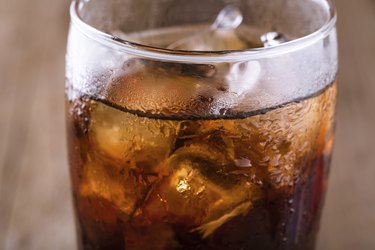
Flat, caffeine-free clear sodas are sometimes recommended to help people keep up their fluid intake and recover from diarrhea. However, you may experience diarrhea after drinking soda, especially if you drink a lot of soda or have an intolerance to one of the ingredients.
Tip
If you're sensitive to fructose, the high-fructose corn syrup in soda can cause loose stools. You can also get diarrhea if you drink a lot of soda with caffeine or artificial sweeteners.
Video of the Day
Caffeine Content in Soda
Caffeinated sodas can cause diarrhea if you drink them in excess. Although caffeine can have a laxative effect, the FDA recommends 400 milligrams a day, or about 4 or 5 cups of coffee, as an amount of caffeine not generally associated with negative effects.
Video of the Day
Colas and other caffeinated sodas range in caffeine content. For example, a 12-ounce can of Coke contains 34 milligrams for a 12-ounce can, and Diet Coke contains 46 milligrams of caffeine. If you have loose stools every morning because of a sensitivity to caffeine from drinking soda, choose caffeine-free drinks such as ginger ale, tonic, club soda or Sprite.
Fructose Malabsorption Issues
Some people have difficulties breaking down and absorbing the sugar fructose, which is found in the high-fructose corn syrup used to sweeten many regular sodas. In these people, drinking beverages high in fructose can cause more frequent and loose bowel movements. Other potential symptoms include:
- Bloating
- Belly pain
- Heartburn
- Gas
By avoiding all fructose-containing foods for a short time, including fruits, sodas, honey and alcohol, and then reintroducing them, you may be able to determine whether you are fructose-intolerant. Your doctor can also test you for this condition.
Read more: Healthy and Unhealthy Foods High in Fructose
Sugar Alcohols and Diarrhea
Sugar alcohols are also sometimes used to sweeten low-sugar or diet sodas. These substances, including sorbitol, tagatose and mannitol, can cause diarrhea if you consume them in large amounts. Diarrhea and gas are more likely if you get more than 20 grams per day of mannitol or more than 50 grams per day of sorbitol, according to Harvard Medical School.
Some people experience gastrointestinal symptoms in addition to diarrhea after consuming sorbitol, including flatulence, IBS and constipation, according to a report published in the International Journal of Dentistry in 2016.
Any soda that says "no sugar added" or "sugar free" on the label must include the amount of sugar alcohols it contains on the nutrition facts label, so you'll be able to determine which sodas contain significant amounts of sugar alcohols and how much you're getting.
Other Artificial Sweeteners
Certain other artificial sweeteners used in diet sodas could cause diarrhea, at least in sensitive individuals. Sucralose can have gastrointestinal effects, including gas, bloating and diarrhea. Some people who are sensitive to aspartame have reported abdominal pain, nausea or diarrhea when they consume foods or beverages containing this artificial sweetener.
Read more: The Ultimate Guide to Natural Sweeteners
Soda Additives and Alternatives
If you have loose stools every morning because of a sensitivity to caffeine from drinking soda, choose caffeine-free drinks such as ginger ale, tonic, carbonated water, cream soda, root beer or Sprite.
Many diet sodas contain artificial sweeteners so read labels carefully if you react to any of these additives. Aspartame is marketed as NutraSweet, AminoSweet, Equal and Canderel. Common sugar alcohols are mannitol, sorbitol, xylitol, lactitol, isomalt, maltitol and hydrogenated starch hydrolysates.
- NHS Inform: "Diarrhoea"
- International Foundation for Functional Gastrointestinal Disorders: "Common Causes of Chronic Diarrhea"
- American Gastroenterological Association: "Fructose Malabsorption"
- Harvard Medical School: "Are Artificial Sweeteners Safe?"
- Columbia Health: "Sucralose (Splenda)"
- U.S. Food and Drug Administration: "Additional Information About High-Intensity Sweeteners Permitted for Use in Food in the United States"
- MedlinePlus: "Caffeine in the Diet"
- Yale-New Haven Hospital: "Eat Any Sugar Alcohol Lately?"
- International Journal of Dentistry: "Gastrointestinal Disturbances Associated With the Consumption of Sugar Alcohols With Special Consideration of Xylitol: Scientific Review and Instructions for Dentists and Other Health-Care Professionals"
- CocaCola Product Facts: "How Much Caffeine is in Coke? How Much Caffeine Is in Diet Coke?"
- FDA: "Spilling the Beans: How Much Caffeine Is Too Much?"
- Source Watch: "Aspartame"